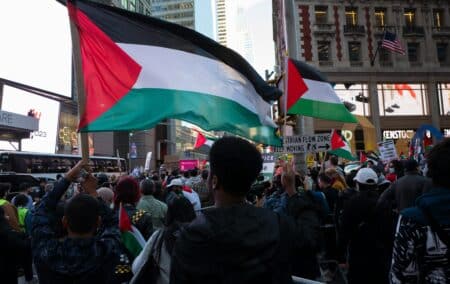A recent survey commissioned by the Women’s Action Campaign SA (WACSA) found that a clear majority (79%) of South Africans view Hamas’s attack on 7 October 2023 as an unjustified act of terror.
Seventy per cent would support prosecuting Hamas militants for war crimes at the International Criminal Court. More than half believe the South African government should apply maximum pressure to achieve this.
As international pressure mounts for Israel to end its campaign to dismantle Hamas, and in the face of widespread denial of the atrocities that precipitated it, proof of Hamas’s crimes takes on an added layer of significance. Particularly harrowing is the growing body of evidence that sexual violence was a clear operational strategy of the Hamas militants.
On 7 October, it is estimated that some 3 000 Hamas militants rampaged through communities in Israel bordering the Gaza Strip. Thousands of people were subjected to targeted and brutal attacks, the vast majority of whom were civilians. The evidence tells a horrific story of people burnt alive in their homes or bomb shelters. Some bodies were found decapitated, mutilated, or both. There is evidence of sexual torture, including rapes and gang rapes, sexual assaults, and the genital mutilation of both men and women.
Based on the number of fatalities, security experts reported that Hamas’s attack is the third-deadliest terrorist attack since data collection began in 1970. The 2014 Tikrit Attack in Iraq by Islamic State, killing 1 700, is the second deadliest, and the 9/11 attacks in the USA, killing 2 996, were considered the worst.
Gross violations
Although it took the United Nations (UN) two months to acknowledge the severity of the sexual violence committed on 7 October, its experts now also agree that these acts constitute gross violations of international law, amounting to war crimes. Given the number of victims and the extensive premeditation and planning that went into the attack, these war crimes may also constitute crimes against humanity.
Last week the UN’s special envoy on sexual violence in conflict reported that there was “clear and convincing information that sexual assaults including rape and gang-rape in several places took place during the 7 October attacks by Hamas.
In addition, the UN acknowledged that both Hamas and Israel have breached international humanitarian law. Targeting civilians is strictly prohibited, and intentionally targeting and killing civilians are both war crimes.
An opinion by Jill Filipovic noted that the horrors of this war do not have to be either/or. One can face the mountain of evidence of the systematic and deliberate use of sexual violence on 7 October as well as confronting the staggering Gazan death toll. It is not acceptable that civilians have become collateral damage. Lives have been brutally snatched away in both Gaza and Israel; thousands will carry the burden of displacement, loss and trauma for the rest of their lives.
Overlooked
In South Africa, our government appears to have overlooked this when launching its case against Israel at the International Court of Justice (ICJ). President Cyril Ramaphosa told South Africans that its application to the ICJ argued that the high civilian death toll and sheer scale of the destruction resulting from Israel’s response to the 7 October attack are vastly disproportionate to Israel’s claim that it has been acting in self-defence.
Aside from the mounting evidence, our President failed to consider Hamas’s practice of embedding itself within the civilian population to maximise the damage caused by Israeli attacks. Experts have said that Hamas displays a callous indifference to civilian life. In numerous statements over the years, Hamas has made clear that it sees civilian deaths as both inevitable and valuable. In saying this, however, I do not believe it absolves Israel from all responsibility for the force it is using, resulting in a high civilian death toll and an unfolding humanitarian crisis.
War crimes
But given that both sides have been, and are, committing war crimes, it appears that our government’s ICJ case has missed the mark. Experts such as Chile Eboe-Osuji, a former president of the International Criminal Court (ICC), have cautioned that by not initiating proceedings against Hamas and failing to examine crimes other than genocide, South Africa’s ICJ case is too narrowly focused.
South Africa’s Minister of International Affairs, Naledi Pandor, commented recently that Hamas must be investigated for war crimes. This suggests that the government might be reconsidering its position.
The WACSA survey shows that South Africans would support an investigation and the prosecution of Hamas militants for the war crimes committed on 7 October. Although we understand that it is not the South African government’s mandate to lodge a legal case against Hamas at the ICC, we do hope our government will go further than condemnation, and insist that Hamas is held accountable for its actions on 7 October. We want to see our government pursue this with the same enthusiasm as in its ICJ case against Israel.
The views of the writer are not necessarily the views of the Daily Friend or the IRR
If you like what you have just read, support the Daily Friend
Photo by shavnya.com on Unsplash

